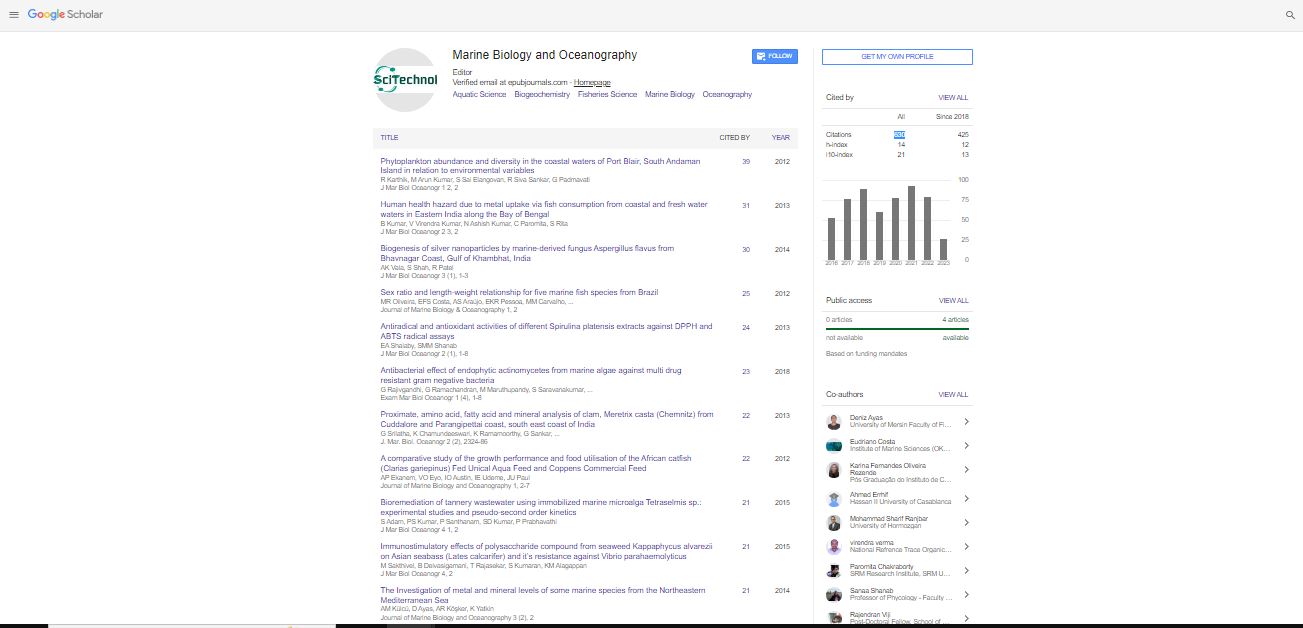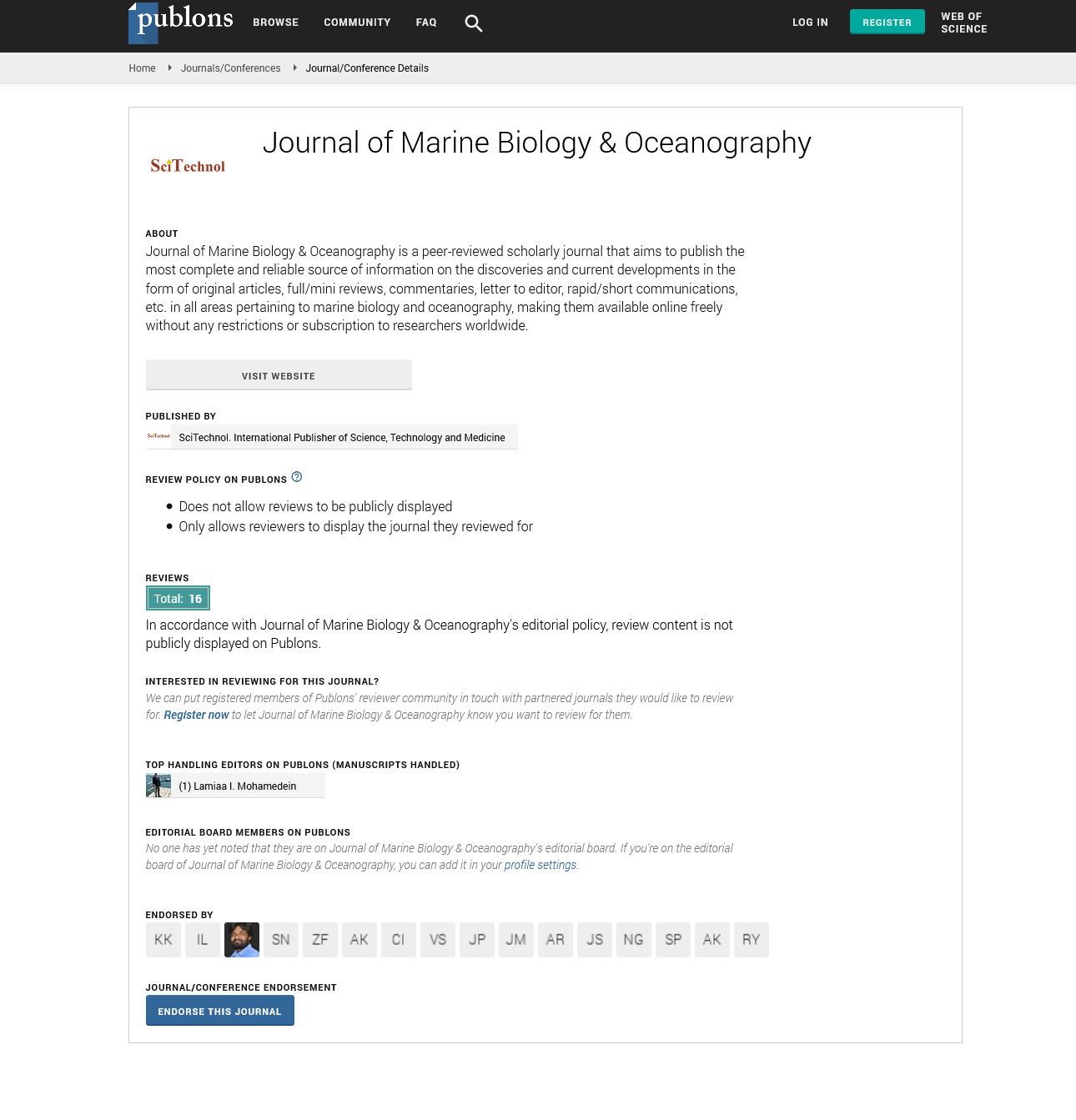Commentary, J Mar Biol Oceanogr Vol: 12 Issue: 3
Assessing the Effects of Marine Geochemistry on Marine Ecosystem Dynamics
Lima Cohen*
1Department of Geology, Ekiti State University, Ado-Ekiti, Nigeria
*Corresponding Author: Lima Cohen,
Department of Geology, Ekiti State University, Ado-Ekiti, Nigeria
E-mail: lima_cohen@esu11.ng
Received date: 22 May, 2023, Manuscript No. JMBO-23-105096;
Editor assigned date: 25 May, 2023, PreQC No. JMBO-23-105096 (PQ);
Reviewed date: 08 June, 2023, QC No. JMBO-23-105096;
Revised date: 15 June, 2023, Manuscript No. JMBO-23-105096 (R);
Published date: 22 June, 2023, DOI: 10.4172/2324-8661.1000272.
Citation: Cohen L (2023) Assessing the Effects of Marine Geochemistry on Marine Ecosystem Dynamics. J Mar Biol Oceanogr 12:3.
Description
Marine ecosystems are complex and diverse environments that are influenced by numerous factors, including marine geochemistry. The chemical composition of seawater plays an essential role in shaping the health and stability of marine environments. Understanding the effects of marine geochemistry on ecosystem dynamics is important for safeguarding these delicate systems in the face of environmental challenges.
Marine organisms are highly adapted to the chemical properties of seawater. Variations in pH, salinity, dissolved oxygen, and nutrient availability can greatly influence the distribution, abundance, and behavior of marine life. For example, changes in ocean acidification due to increased carbon dioxide levels can disrupt the growth and calcification of coral reefs, impacting entire reef ecosystems. Similarly, variations in nutrient concentrations can trigger algal blooms, leading to oxygen depletion and developing "dead zones" harmful to marine organisms.
Marine geochemistry plays an essential role in nutrient cycling within marine ecosystems. Nutrients such as nitrogen and phosphorus are essential for primary production, fueling the growth of phytoplankton and supporting the marine food web. The availability of these nutrients is regulated by complex biogeochemical processes, including biological uptake, remineralization, and sedimentary cycling. Imbalances in nutrient ratios or excessive nutrient inputs from human activities can disrupt these cycles, resulting in harmful algal blooms, eutrophication, and subsequent ecosystem degradation.
Trace elements, although present in minute concentrations, can exert significant effects on marine ecosystems. Iron, for instance, is an important micronutrient for phytoplankton growth, affecting primary production rates and subsequent trophic interactions. Understanding the sources, transport, and biological utilization of trace elements is essential to comprehending the intricate web of ecological interactions within marine ecosystems. Human-induced perturbations, such as industrial pollution or mining activities, can introduce excessive amounts of trace elements, leading to toxicity and bioaccumulation in marine organisms.
The ongoing climate change crisis has profound implications for marine geochemistry and ecosystem dynamics. Rising sea temperatures, altered ocean currents, and changing precipitation patterns can all influence the chemical properties of seawater. These changes, in turn, impact the distribution and behavior of marine organisms, disrupt nutrient cycling, and alter the balance of marine ecosystems. For example, warming temperatures can lead to increased stratification and reduced nutrient availability in surface waters, affecting the productivity and composition of marine communities.
Understanding the effects of marine geochemistry on ecosystem dynamics is necessary for effective conservation and management strategies. By monitoring key chemical parameters, such as pH, dissolved oxygen, and nutrient concentrations, experts can identify potential stressors and predict ecosystem responses to environmental changes. Integrated approaches that consider both physical and chemical factors can help in developing sustainable practices and mitigating the impacts of human activities on marine ecosystems.
Conclusion
Marine geochemistry plays a fundamental role in shaping the dynamics of marine ecosystems. By assessing the effects of the chemical properties of seawater on marine life, nutrient cycling, and ecological interactions, one can gain valuable insights into the functioning and resilience of these fragile systems. The ongoing challenges posed by climate change and human activities necessitate a comprehensive understanding of marine geochemistry to inform conservation efforts and ensure the long-term health and sustainability of marine ecosystems. Continued studies and monitoring are vital for adapting to the dynamic nature of the oceans and protecting their invaluable biodiversity. By regularly measuring and analysing key chemical parameters, such as pH, oxygen levels, nutrient concentrations, and trace element dynamics, one can detect changes and patterns, which may indicate shifts in ecosystem dynamics.
 Spanish
Spanish  Chinese
Chinese  Russian
Russian  German
German  French
French  Japanese
Japanese  Portuguese
Portuguese  Hindi
Hindi 
